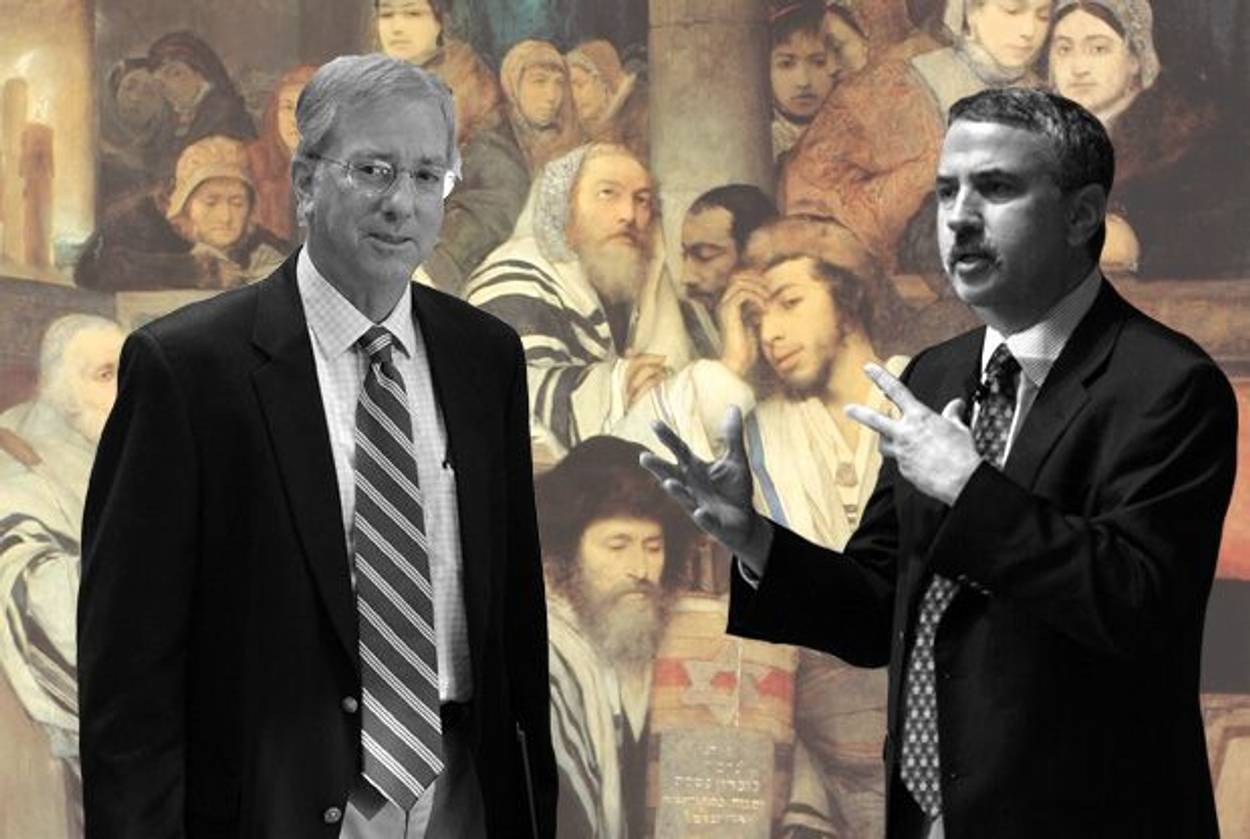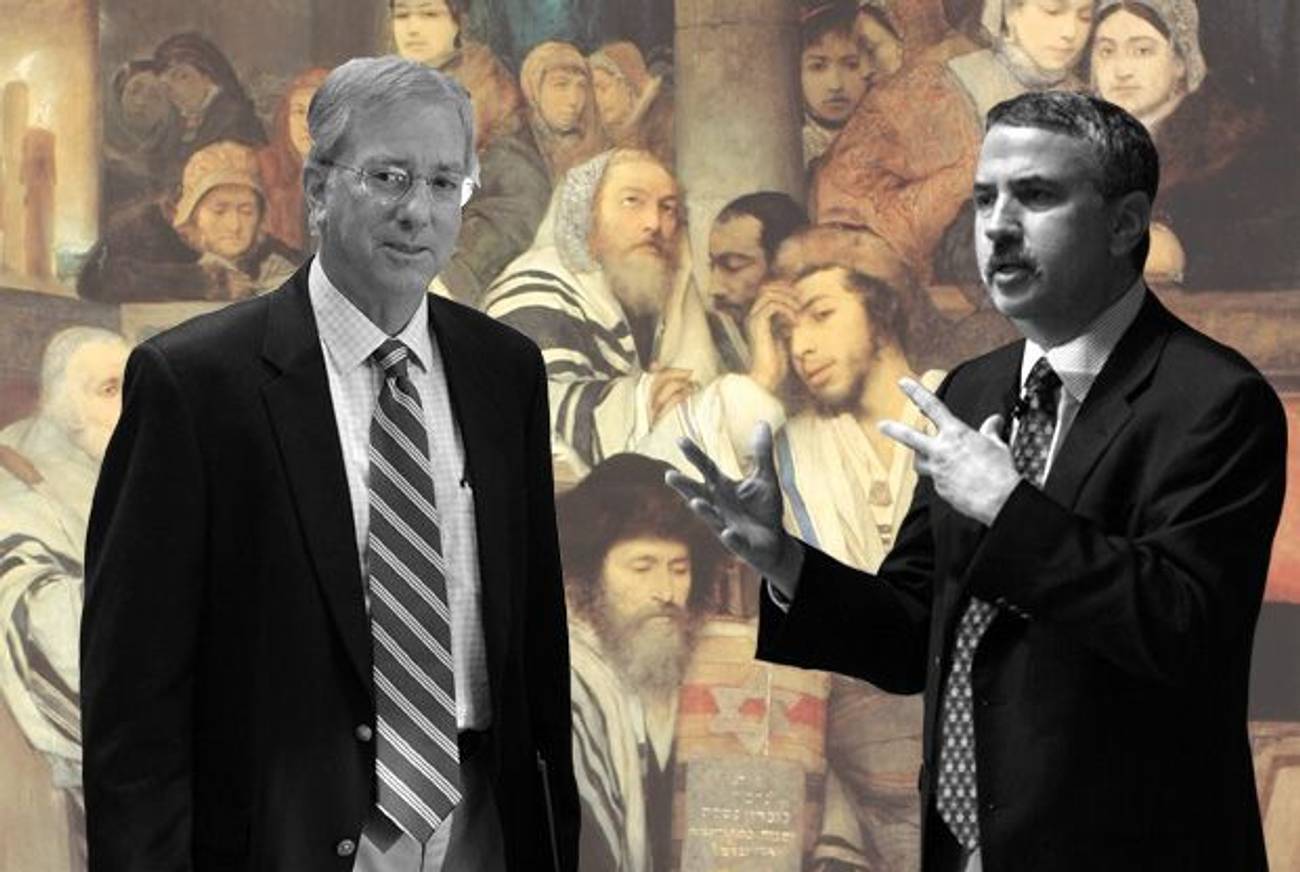Fast Talk
Diplomat Dennis Ross and Times columnist Tom Friedman give an annual Yom Kippur seminar at Kol Shalom in Rockville, Md., a synagogue they helped start




On Saturday afternoon, just after the Yizkor service, Dennis Ross, President Barack Obama’s chief adviser on Middle East affairs, stood in front of his Conservative congregation in the Washington suburb of Rockville, Md., and made a joke about Hafez al-Assad, the late Syrian president. Assad, Ross said, always sat to his right when they met, but on one occasion he moved to take a seat on the left. “I asked him, ‘Is this a political statement?’ ” Ross recounted, as he began an hour-long seminar. “And he said, ‘No, stiff neck.’ ”
Ross, as it happened, was standing on the right side of the bimah—really a low stage in a ballroom at a Hilton hotel, appropriately decked out with an ark, flowers, and banners emblazoned with the congregation’s name: Kol Shalom. The podium on the left was occupied by Ross’ fellow congregant, New York Times columnist Thomas Friedman, who grinned at the diplomat’s joke.
Most synagogues try to fill the dead hours between Yom Kippur morning services and the evening shofar blast with some kind of discussion—or, in recent years, yoga or meditation. Synagogues in Washington have the unique advantage of counting among their ranks people who hold what Ross’ wife, Debbie, has somewhat deprecatingly referred to as “the Big Job.” But what sets Kol Shalom apart from the capital’s other influential Jewish institutions is that here Big Job guys aren’t just members: They’re the founders.
Ross and Friedman helped start the congregation 10 years ago this month, along with a handful of families who had been members at Congregation Beth El, in Bethesda, Md. “We wanted a synagogue where there was a lay-professional partnership, where there was a learning congregation,” Marilyn Wind, the founding president and current board chair, explained to me last week. For the first half-year, the roving congregation was entirely lay-led and met in facilities rented from the 4-H Club or from churches—an experience Friedman memorialized in a December 2001 column.
Friedman, who had been at Beth El, joined Kol Shalom at the urging of organizers who were old friends from Des Moines, where Friedman’s wife, Ann, grew up. Debbie Ross explained that for her family, timing was everything. “It started right after September 11, and it was such a scary time,” she said over lunch recently. “No one knew what was going to happen, and this was something we could do, a way to use our own energy and talent to do something positive at that unsettled time.” Dennis Ross, newly in the political wilderness after years spent as President Bill Clinton’s Middle East envoy, also signed up as a trustee. Other early members included Mitch Caplan, the former CEO of E*Trade, and the late New York Times columnist William Safire.
It was Safire, in fact, who was chiefly responsible for cementing Ross and Friedman’s joint ownership of the Yom Kippur afternoon speaking slot. “In 2004 or 2005, I asked Bill to do it,” Kol Shalom’s rabbi, Jonathan Maltzman, told me when we met over the summer. “I think Dennis and Tom were a little upset, and they said to me, ‘No, we’ll do it every year.’ ” Ross made sure to announce that they plan to continue the tradition next year, after Kol Shalom moves into the new sanctuary it is building in Rockville. “This is our thing, and we’re pretty protective of it,” he told me, with a slightly abashed smile.
It is, as things go, a relatively easy gig for two men who make their livings speaking extemporaneously about Middle East affairs. Both men’s wives, who said they have sweated out writing memorable blessings or the d’var Torah sermons members regularly volunteer to give—Debbie Ross gave last week’s, at the Shabbat service between Rosh Hashanah and Yom Kippur—just laughed when asked whether their husbands prepared their talks.
Ross, who was in Beltway-issue shirtsleeves, tie, and khakis and a large blue-and-white Bukhari-style kippah, kicked things off by talking about the Arab Spring. Both a panel of expert advisers convened by the Obama Administration in the summer of 2010 and, more tellingly, a group of Arab dissidents and democracy activists brought to Washington just a few weeks before the revolution began in Tunisia, had failed to anticipate the dramatic events. When his turn came to speak, Friedman—wearing a dark blue suit and satin kippah—pointed out that he’d actually gone on an Israeli television news show a year ago and warned, like Chicken Little, that a storm was brewing in the Arab world. “I said, get out of the West Bank, build the highest wall you can,” said Friedman. “I will personally come and put on the last brick, but there is a storm coming, and you need to get out of their story.” He has been on book tour, and it showed: There was much well-rehearsed talk about the flattening effects of Facebook and Twitter and YouTube.
In some ways, they make an odd pair: Ross is a clear and concise speaker but gives off an almost diffident air, whereas Friedman is an experienced showman who lobs regular sound bites, many taken from his columns. (Kol Shalom members who are regular Times op-ed readers may have recalled his unfavorable comparison of Israel Prime Minister Benjamin Netanyahu to former Egyptian Prime Minister Hosni Mubarak from a May 24 column.) But Ross and Friedman spoke mostly in parallel, dividing up questions from the audience rather than debating each other—a mark of familiarity as much as a sign of the solemnity of the day. At one point, in response to a question about Netanyahu’s reaction to the Arab Spring, Friedman stepped in to remind the audience that Ross couldn’t say anything controversial: “I’m free to talk, while Dennis isn’t.” The envoy remained pokerfaced, while the crowd, many of whom Ross called on by name, laughed knowingly.
Soon afterward, the two stepped off the stage and went back to chatting with friends about more pressing issues, like the lemon cake Debbie Ross had baked for break fast.
CORRECTION, October 17: Friedman wore a dark blue suit, not a brown one, on Yom Kippur. This article has been corrected.
Allison Hoffman is a senior editor at Tablet Magazine. Her Twitter feed is @allisont_dc.